Several years past the golden age of television lay bygone reminisces of my early childhood. In our collective psyche, approved by Mr. Clean and Chef Boy-Ar-Dee, Superman 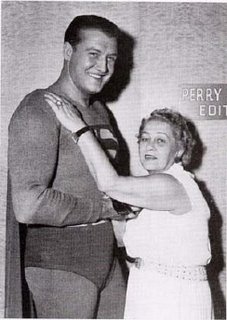 made the day for seventy-eight million of us baby boomers, even in reruns. From the small screen’s mythical ethers he arose, persona grata, within actor George Reeves. His heroic icon still springs eternal in the figments of our imagination. "Knock the "t" off the "can't," Reeves always said.
made the day for seventy-eight million of us baby boomers, even in reruns. From the small screen’s mythical ethers he arose, persona grata, within actor George Reeves. His heroic icon still springs eternal in the figments of our imagination. "Knock the "t" off the "can't," Reeves always said. Everyone was affected by him, and seems to have an opinion or comment about his work and life to this day. The late Christopher Reeve and Keanu Reeves both took names that invoke him. And the Superman franchise follows “in suit” to yet another generation. His legacy made us want to be better people, despite his suicide. He was allegedly “despondent” after being typecast and facing career crises as an aging actor. Preceded by Marilyn Monroe, who decided that “Hollywood is a place where they’ll pay you a thousand
Everyone was affected by him, and seems to have an opinion or comment about his work and life to this day. The late Christopher Reeve and Keanu Reeves both took names that invoke him. And the Superman franchise follows “in suit” to yet another generation. His legacy made us want to be better people, despite his suicide. He was allegedly “despondent” after being typecast and facing career crises as an aging actor. Preceded by Marilyn Monroe, who decided that “Hollywood is a place where they’ll pay you a thousand 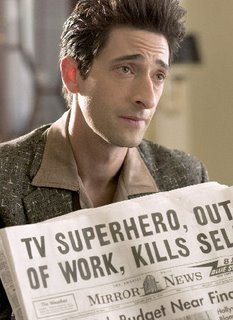 dollars for a kiss and fifty cents for your soul.” The circumstances of both deaths were determined suicides and shabbily resolved; there are still a multitude of unanswered questions about them both. Hollywoodland epitomizes reel life, generalizes real life, and lays bare the relative ethos of those persevering to reach the A-list. Not a crime mystery per se, this retrospective is a mesmerizing film!
dollars for a kiss and fifty cents for your soul.” The circumstances of both deaths were determined suicides and shabbily resolved; there are still a multitude of unanswered questions about them both. Hollywoodland epitomizes reel life, generalizes real life, and lays bare the relative ethos of those persevering to reach the A-list. Not a crime mystery per se, this retrospective is a mesmerizing film! 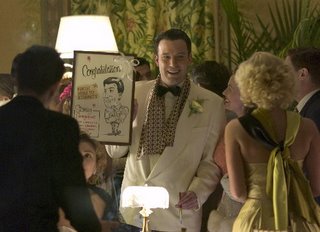 Director Allen Coulter, of Sopranos fame, gives us an existential show of fragmented and wasted meaningful perceptions. There is a rumbling philosophical tsunami beyond its too few facts that hasn’t quite hit the shore. I was thoroughly engrossed waiting for the possibilities of some shocking truth that never happened. The film exposes those same dirty games and thuggery in play today. As William Faulkner observed, “Hollywood is a place where a man can get stabbed in the back while climbing a ladder." Reeves’s wavering personality was as appealing as his on-screen persona. He was nailed by the fun sullen charm of actor Ben Affleck, who won a golden lion at the Venice Film Festival to validate his excellent
Director Allen Coulter, of Sopranos fame, gives us an existential show of fragmented and wasted meaningful perceptions. There is a rumbling philosophical tsunami beyond its too few facts that hasn’t quite hit the shore. I was thoroughly engrossed waiting for the possibilities of some shocking truth that never happened. The film exposes those same dirty games and thuggery in play today. As William Faulkner observed, “Hollywood is a place where a man can get stabbed in the back while climbing a ladder." Reeves’s wavering personality was as appealing as his on-screen persona. He was nailed by the fun sullen charm of actor Ben Affleck, who won a golden lion at the Venice Film Festival to validate his excellent 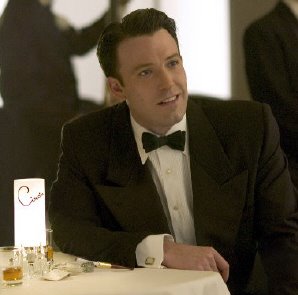 portrayal. Both are dynamos, and there are immediate and recognizable similarities in his own life that permeate Reeves’. In today’s world, the Reeves affair would have been public knowledge and, likely, only a temporary career setback, not a suicidal end, because he was so well-liked. And although Mr. Affleck’s life has overshadowed his talent, his sexual press could also be considered career suicide due to his typecast roles. But, he too, is well-liked. He throws in other hints of his life in the film, as well....All aspects of the production and cast have taken their place and run well with their tasks.
portrayal. Both are dynamos, and there are immediate and recognizable similarities in his own life that permeate Reeves’. In today’s world, the Reeves affair would have been public knowledge and, likely, only a temporary career setback, not a suicidal end, because he was so well-liked. And although Mr. Affleck’s life has overshadowed his talent, his sexual press could also be considered career suicide due to his typecast roles. But, he too, is well-liked. He throws in other hints of his life in the film, as well....All aspects of the production and cast have taken their place and run well with their tasks. 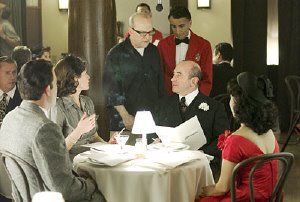 ”The concealment of art by the actor is as great a mark of genius as it is in the painter,” expounded French acting teacher Francois Delsarte. As does often happen in real life, Hollywoodland places all the troubled blame on the womenfolk in his life, when most of it lies deservedly within ego and on the macho trappings of image. In flashbacks, Mr. Reeves has an affair with a spousal-powerful, fastly aging, married women, for her favors and, to get more work. Toni Mannix is deftly portrayed by the hotly obsessive Diane Lane.
”The concealment of art by the actor is as great a mark of genius as it is in the painter,” expounded French acting teacher Francois Delsarte. As does often happen in real life, Hollywoodland places all the troubled blame on the womenfolk in his life, when most of it lies deservedly within ego and on the macho trappings of image. In flashbacks, Mr. Reeves has an affair with a spousal-powerful, fastly aging, married women, for her favors and, to get more work. Toni Mannix is deftly portrayed by the hotly obsessive Diane Lane. 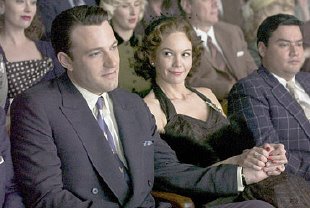 Her husband, Eddie Mannix, lovingly played by the bossy and overprotective Bob Hoskins, runs MGM and their "open" marriage. Reeves and Mannix play around until The Adventures of Superman is cancelled. Toni never helps him find work after that. She is spurned when he goes to New York, and it is implied she shot her 6'4" lover in the temple because of their break-up. There Reeves meets his future fiancé, Leonora Lemon. He brings her back to L.A. where they have a rocky relationship, and he allegedly dumps after several months. She is also implied to have shot her 6'4" ex-fiance in the temple because of their break-up. She is portrayed as a opportunistic social climber, and is played fabulously supercial by Robin Tunney.
Her husband, Eddie Mannix, lovingly played by the bossy and overprotective Bob Hoskins, runs MGM and their "open" marriage. Reeves and Mannix play around until The Adventures of Superman is cancelled. Toni never helps him find work after that. She is spurned when he goes to New York, and it is implied she shot her 6'4" lover in the temple because of their break-up. There Reeves meets his future fiancé, Leonora Lemon. He brings her back to L.A. where they have a rocky relationship, and he allegedly dumps after several months. She is also implied to have shot her 6'4" ex-fiance in the temple because of their break-up. She is portrayed as a opportunistic social climber, and is played fabulously supercial by Robin Tunney. 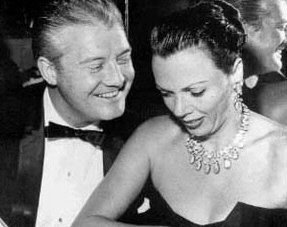
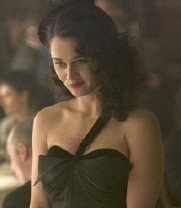 The quadrangle ensues, never resolved. A few beatings and a couple of payoffs later, his death is ruled a suicide. His demise is never explained: who could shoot a 6'4" man to death, at close range, in his temple? And it is lightly answered that only he could do that to himself. “I don't mind living in a man's world as long as I can be a woman in it,” as Monroe was wont to say. Hollywoodland doesn’t expose the hidden use of lawyers to pressure and cover-up before
The quadrangle ensues, never resolved. A few beatings and a couple of payoffs later, his death is ruled a suicide. His demise is never explained: who could shoot a 6'4" man to death, at close range, in his temple? And it is lightly answered that only he could do that to himself. “I don't mind living in a man's world as long as I can be a woman in it,” as Monroe was wont to say. Hollywoodland doesn’t expose the hidden use of lawyers to pressure and cover-up before 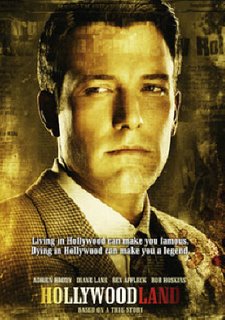 speculations and suspicions become gossip, accusation, and indictment. But you know they are there, involved somewhere, as fixers, the doers big brother employ. They are everywhere implied in those unseen legal binding connections of finance, of which any impropriety dismisses future contact outright. In real life a lawyer named Geisler was hired by Reeves's mother, Helen Bessolo, to be the fixer, not a P.I., as this film depicts.
speculations and suspicions become gossip, accusation, and indictment. But you know they are there, involved somewhere, as fixers, the doers big brother employ. They are everywhere implied in those unseen legal binding connections of finance, of which any impropriety dismisses future contact outright. In real life a lawyer named Geisler was hired by Reeves's mother, Helen Bessolo, to be the fixer, not a P.I., as this film depicts. 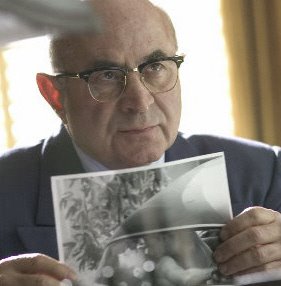 Such "fixers" are directly spoken of to those about to go under contract, who must abide and live their lives by these connections or live without them. The pursuit and signing of these type of contracts has mocked constitutional rights and made lives voidable. "Hollywood is a place where they place you under contract instead of under observation," as Walter Winchell surmised. Underlying all the fake passion that rules all those twice told tales of and the battles that rage from within, expressed throughout Hollywoodland. However, it is possession which determines the success and direction a life will flow. Enforcements are made first by the claims of big money, while lesser others fall to the wayside, unable to afford the relief they need.
Such "fixers" are directly spoken of to those about to go under contract, who must abide and live their lives by these connections or live without them. The pursuit and signing of these type of contracts has mocked constitutional rights and made lives voidable. "Hollywood is a place where they place you under contract instead of under observation," as Walter Winchell surmised. Underlying all the fake passion that rules all those twice told tales of and the battles that rage from within, expressed throughout Hollywoodland. However, it is possession which determines the success and direction a life will flow. Enforcements are made first by the claims of big money, while lesser others fall to the wayside, unable to afford the relief they need. 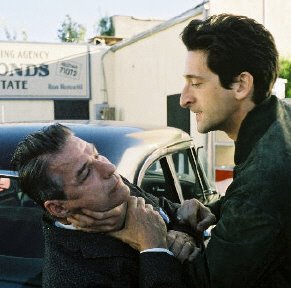 It is a set-up from the beginning. There were no real choices to be mulled over. No fruitful decisions to be made. Beyond immediate gratifications, the rest of life had already been planned because a contract, or its negotiation, even a verbal one, was already been made. A done deal for an elite membership and career route already defined. It is part and parcel of the threadbare commonality accompanying most acting careers. Reeves' mysterious end death is still one of the most notorious deaths in Hollywood history.
It is a set-up from the beginning. There were no real choices to be mulled over. No fruitful decisions to be made. Beyond immediate gratifications, the rest of life had already been planned because a contract, or its negotiation, even a verbal one, was already been made. A done deal for an elite membership and career route already defined. It is part and parcel of the threadbare commonality accompanying most acting careers. Reeves' mysterious end death is still one of the most notorious deaths in Hollywood history.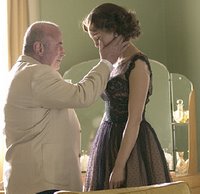 Ratings and box office earnings are still king, today, at the networks and studios, respectively, and even today, a similar death can easily happen, again. “Behind the phony tinsel of Hollywood lies the real tinsel,” Oscar Levant has famously declared. These A-listers and wannabees are public people of whose truths will never be discovered, they have this protection guaranteed, legally pre-empted. In this social Darwinism for the aspiring classes, the rat race promise implied is that authority will let you off, or will give you success for your silence, if your information can harm them. This is what Louis Simo, a private investigator and Reeves’s greedy selfish mother, Helen Besselo, have to face down. “I'll do anything for money - even associate with my agent,” mused the late, great Vincent Price. It appears George Reeves has found his immortality after all, as an actor
Ratings and box office earnings are still king, today, at the networks and studios, respectively, and even today, a similar death can easily happen, again. “Behind the phony tinsel of Hollywood lies the real tinsel,” Oscar Levant has famously declared. These A-listers and wannabees are public people of whose truths will never be discovered, they have this protection guaranteed, legally pre-empted. In this social Darwinism for the aspiring classes, the rat race promise implied is that authority will let you off, or will give you success for your silence, if your information can harm them. This is what Louis Simo, a private investigator and Reeves’s greedy selfish mother, Helen Besselo, have to face down. “I'll do anything for money - even associate with my agent,” mused the late, great Vincent Price. It appears George Reeves has found his immortality after all, as an actor 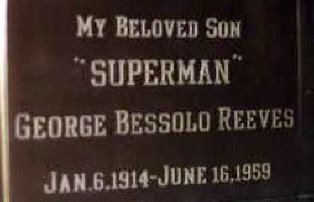 and as a character. Both live on in equanimity, in the astonishing dissimilar sides of a singular being, as this movie reveals. My guess is that his ever widening psychic psychic would have engulfed everybody he knew had we known more about him. This is the greatest mystery of George Reeves. We are left never knowing what want to know, and are left only to ponder what could be the truth or not. And we let it go because he was Superman, our hero. We want him more as Superman. Knowing more might destroy Superman and leave us with George Reeves, whoever he was, unless he had played some other popular role as well. Only then could we have them both on equal footing. Sure, in the back of his mind, George Reeves must have thought so, too. That he could take or leave Superman, and not be stuck with him as he is, if he was known for other characters. George must become more famous than Superman. He would only be his character otherwise. As they are promised more to goad a sell out, damage control can only allow minor dirty gossip, in baseless speculation and suspicion. The Mannixes are safe from
and as a character. Both live on in equanimity, in the astonishing dissimilar sides of a singular being, as this movie reveals. My guess is that his ever widening psychic psychic would have engulfed everybody he knew had we known more about him. This is the greatest mystery of George Reeves. We are left never knowing what want to know, and are left only to ponder what could be the truth or not. And we let it go because he was Superman, our hero. We want him more as Superman. Knowing more might destroy Superman and leave us with George Reeves, whoever he was, unless he had played some other popular role as well. Only then could we have them both on equal footing. Sure, in the back of his mind, George Reeves must have thought so, too. That he could take or leave Superman, and not be stuck with him as he is, if he was known for other characters. George must become more famous than Superman. He would only be his character otherwise. As they are promised more to goad a sell out, damage control can only allow minor dirty gossip, in baseless speculation and suspicion. The Mannixes are safe from 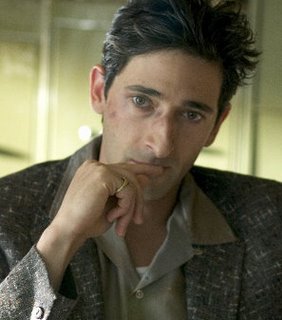 confrontation and criticism, of their shady affairs, investments, and mafia dealings. With or without clamor, these empty promises held their goal. The results are a few more enemies on top of nothing. Their flattery having so easily manipulated ego-driven fame, that which is most thin-skinned about the industry. More won’t happen because the status quo is secure in its kept secrets. Besselo sells out, to keep her son's legacy alive, and leaves Simo without a case, and, despite all his Raymond Chandler leanings, he goes no further. He leaves the money, and the case is over. “Success consecrates the most offensive crimes,” so Seneca, the famed tradgedician during Nero’s Rome, still echoes timelessly. And Simo too, has finally arrived at a conclusion, but as a real man, in his daily mundaneness, having survived the film’s distractions, and forgone its wicked temptations. But for his son, he is newly aware of what could happen to him. His son symbolizes his personal future, and his legacy, a karmic realization, of his attempts to get past his flaws and once and for all to overcome them; to directly engage his life. Both are content with Oliver Wendell Holmes’s expunction.
confrontation and criticism, of their shady affairs, investments, and mafia dealings. With or without clamor, these empty promises held their goal. The results are a few more enemies on top of nothing. Their flattery having so easily manipulated ego-driven fame, that which is most thin-skinned about the industry. More won’t happen because the status quo is secure in its kept secrets. Besselo sells out, to keep her son's legacy alive, and leaves Simo without a case, and, despite all his Raymond Chandler leanings, he goes no further. He leaves the money, and the case is over. “Success consecrates the most offensive crimes,” so Seneca, the famed tradgedician during Nero’s Rome, still echoes timelessly. And Simo too, has finally arrived at a conclusion, but as a real man, in his daily mundaneness, having survived the film’s distractions, and forgone its wicked temptations. But for his son, he is newly aware of what could happen to him. His son symbolizes his personal future, and his legacy, a karmic realization, of his attempts to get past his flaws and once and for all to overcome them; to directly engage his life. Both are content with Oliver Wendell Holmes’s expunction.  This film should be remembered as transcendental, even though its static existentialism initially grabs you. Its timeless message is what holds you in.
This film should be remembered as transcendental, even though its static existentialism initially grabs you. Its timeless message is what holds you in. 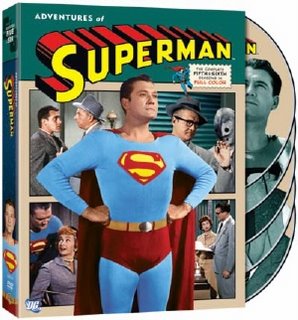 Maybe the next film Mr. Affleck chooses will be an equally stimulating biopic of Peter Jennings. Both George Reeves and Superman are a very tough act to follow. We will always remember them both, equal in fame and infamy. We have felt safe from all harm through his heroic common touch. And forever endeared to him by his gentle Southern charm.:)
Maybe the next film Mr. Affleck chooses will be an equally stimulating biopic of Peter Jennings. Both George Reeves and Superman are a very tough act to follow. We will always remember them both, equal in fame and infamy. We have felt safe from all harm through his heroic common touch. And forever endeared to him by his gentle Southern charm.:)
No comments:
Post a Comment